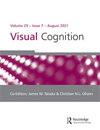关联视觉和图像空间:双眼视差表示距离,运动视差表示方向
IF 1.7
4区 心理学
Q3 PSYCHOLOGY, EXPERIMENTAL
引用次数: 1
摘要
摘要与屏幕上描绘的人和三维物体的互动在感知上与现实生活中的互动不同。这种差异存在于它们相应的感知空间:前者涉及图像空间,后者涉及视觉空间。研究研究了图形或视觉空间的感知几何,但很少研究它们之间的联系。目前的研究使用指向任务将两个空间连接起来,并研究了双眼视差和运动视差如何影响这种连接。在虚拟环境中,一个定点虚拟角色被显示在一个框架内,参与者旋转他以指向视觉空间中的目标。指定的双眼视差和运动视差是独立操纵的,无论是二维表面还是其描绘的三维内容。在实验1中,我们改变了虚拟角色到屏幕的距离,发现双眼视差决定了视觉和图像空间之间的距离关系,但也引入了感知虚拟角色的起伏深度扩展。在实验2中,我们改变了参与者相对于屏幕的视角,发现运动视差决定了视觉和图像空间之间的方向关系。我们讨论了我们的结果在视频媒介电信背景下的理论和实践意义。本文章由计算机程序翻译,如有差异,请以英文原文为准。
Relating visual and pictorial space: Binocular disparity for distance, motion parallax for direction
ABSTRACT Interacting with people and three-dimensional objects depicted on a screen is perceptually different from interacting with them in real life. This difference resides in their corresponding perceptual spaces: The former involves pictorial space, and the latter, visual space. Studies have examined the perceptual geometry of pictorial or visual space, but rarely their connection. The current study connected the two spaces using a pointing task and investigated how binocular disparity and motion parallax affect this connection. In a virtual environment, a pointing virtual character was displayed within a frame and the participants rotated him to point at targets in visual space. What binocular disparity and motion parallax specified was independently manipulated, either the two-dimensional surface or its depicted three-dimensional content. In Experiment 1, we changed the virtual character's distance to the screen and found that binocular disparity determines the distance relationship between visual and pictorial space, but also introduces a relief depth expansion of the perceived virtual character. In Experiment 2, we changed the participants' viewing angle relative to the screen and found that motion parallax determines the directional relationship between visual and pictorial space. We discuss the theoretical and practical implications of our results in the context of video-mediated telecommunication.
求助全文
通过发布文献求助,成功后即可免费获取论文全文。
去求助
来源期刊

VISUAL COGNITION
PSYCHOLOGY, EXPERIMENTAL-
CiteScore
4.20
自引率
10.00%
发文量
29
期刊介绍:
Visual Cognition publishes new empirical research that increases theoretical understanding of human visual cognition. Studies may be concerned with any aspect of visual cognition such as object, face, and scene recognition; visual attention and search; short-term and long-term visual memory; visual word recognition and reading; eye movement control and active vision; and visual imagery. The journal is devoted to research at the interface of visual perception and cognition and does not typically publish papers in areas of perception or psychophysics that are covered by the many publication outlets for those topics.
 求助内容:
求助内容: 应助结果提醒方式:
应助结果提醒方式:


